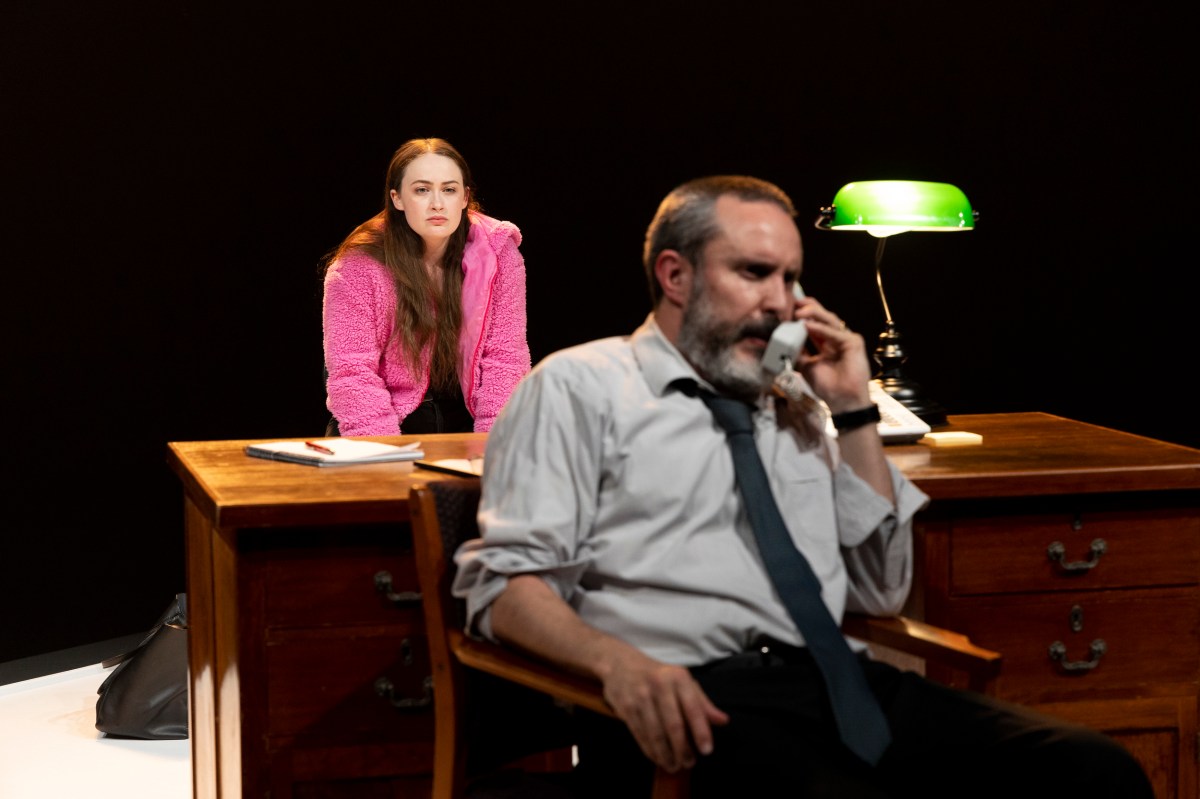After the success of Flying Penguin Productions’ staging of Glengarry Glen Ross last year, director David Mealor and his production company have decided to tackle another David Mamet classic: the controversial 1992 play, Oleanna.
The play focuses on a series of conversations between John, a university professor on the cusp of securing tenure (and the financial comforts that go with it), and Carol, a young student confused and disillusioned by her academic experience.
When it transpires that John and Carol have interpreted their interactions very differently, with Carol bringing forward accusations of sexual harassment, the play raises challenging questions about subjective experience and our perception of reality.
As Oleanna’s tagline reads: ‘Whichever side you choose, you’ll be wrong’.
Renato Musolino is excellent as John, deftly navigating the distinctive rhythms, repetition, and interruptions of Mamet-speak. He captures the professor’s emotional descent from a man who prides himself on being well-spoken, unruffled, and benevolent, to someone whose rage threatens at any moment to burst through this congenial façade. Georgia Laity’s Carol veers from petulant distress to thundering, unmitigated outrage, successfully conveying her increase in self-assurance but perhaps losing some of the nuance of the character.
The production team make excellent use of the flexible staging and seating possibilities afforded by the Space Theatre. The entire play takes place within John’s office, here represented by a small, square stage with a desk and two chairs. Tiered seating rises around this illuminated square, as if the audience members have been gathered as silent witnesses who must form their own judgements and deliver their verdicts.
The stage itself rotates with each Act. In the first, Carol sits before the imposing desk, often with her back to us, while John plays the benign professor, eager to appear empathetic while clearly holding the power in their interaction. In the second, the stage makes a quarter turn and the dynamic shifts, as the two face off head-to-head. For the final act, their positions are reversed, and it is John who supplicates before his student.
Read: Book review: Safar, Sarah Malik
The actors’ movements, too, are thoughtfully choreographed. As Carol’s sense of her own power grows, she begins mirroring back the same physical cues that her professor used in their first meeting: sitting on the desk, looming over him, and taking up space in the room. These interactions culminate in the shocking final sequence, when physical intimidation suddenly accelerates into violent aggression. Composer Quentin Grant’s understated score is the perfect accompaniment, often punctuating the tension with a single menacing note.
Oleanna addresses themes that are particularly sensitive in a post #MeToo age – cancel culture, privilege and power, sexual assault – and refuses to give any definitive answers.
Mealor, in his director’s note, stresses that theatre has a responsibility to stretch and confront our beliefs, rather than confirm them. Audiences are not in for a comfortable evening, but they will certainly come away with plenty to think about.
Oleanna by David Mamet
Presented by Flying Penguin Productions
Space Theatre, Adelaide Festival Centre
Director: David Mealor
Assistant Director: Connor Reidy
Set and Costume Designer: Kathryn Sproul
AV and Lighting Designer: Chris Petridis
Associate Lighting Designer: Aaron Herczeg
Composer and Sound Designer: Quentin Grant
Stage Manager: Marg Crompton
Cast: Georgia Laity, Renato Musolino
Oleanna will be performed until 26 November 2022.





